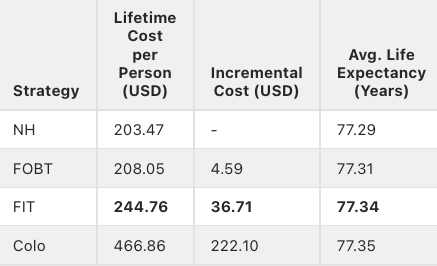Estimated costs and cost-effectiveness of a pediatric weight management program
Meg Simione*, Sophie Wagner*, Caroline J Kristin, Kelsey A. Egan, Sheila Kelly, William G. Adams, Elsie M. Taveras, Chin Hur
Childhood obesity remains a major public health issue, with disparities in access to care. My research used a Markov cohort model to evaluate the cost-effectiveness of the Connect for Health pediatric weight management program. Based on trial and implementation data, we estimated that startup costs were $58K, with ongoing costs of $1.3K per month. The program had an incremental cost-effectiveness ratio (ICER) of $9,217 per QALY gained over two years, suggesting it is a cost-effective intervention in primary care. Our findings highlight the importance of scaling the program to ensure equitable access to obesity care for children in underserved communities.
*equal contribution
Cost-effectiveness of liquid biopsy for colorectal cancer screening in patients who are unscreened
Zainab Aziz, Sophie Wagner, Alice Agyekum, Yoanna S. Pumpalova, Matthew Prest, Francesca Lim, Sheila Rustgi, Fay Kastrinos, William M. Grady, Chin Hur
Despite recommendations, only ~60% of eligible individuals undergo colorectal cancer screening in the U.S. My research used a Markov model to compare standard and alternative screening strategies, including liquid biopsy (LB). While colonoscopy remained the most cost-effective option at $28K per life-year gained, adding LB as a secondary screening method improved life-years but was not cost-effective at current costs. Future reductions in LB costs could make it a viable option to increase screening rates.
Impact of prior upper endoscopy on gastric cancer stage and survival
Sophie Wagner, Jennifer S. Ferris, Josephine Soddano, Ji Yoon Yoon, Sheila D. Rustgi, Haley Zylberberg, Jeong Yun Yang, Yongmei Huang, Ling Chen, Chin Hur
Gastric cancer survival in the U.S. is poor, with only 36% surviving five years and many diagnosed at advanced stages. While screening with upper endoscopy (EGD) improves early detection in high-incidence countries, no guidelines exist in the U.S. Using the national SEER-Medicare database, we conducted a retrospective cohort study to assess whether prior EGD (6-36 months before diagnosis) was linked to earlier-stage detection and improved survival. We applied inverse propensity treatment weighting (IPTW), logistic regression, and Cox models to compare stage at diagnosis and survival between those with and without prior EGD.
Manuscript submitted to The American Journal of Gastroenterology (under review)
Cost-effectiveness of colorectal cancer screening in the Dominican Republic
Yoanna S. Pumpalova, Sophie Wagner, Alice Agyekum, Zainab Aziz, Andria Reyes, Dolores Magdalena Mejia De la Cruz, María Fernanda Cedeño, Julio Rivas, Omar Ebrahim, Karla Marie Disla Pineda, Ann Stephany Sanchez De Rodriguez, Chin Hur
To inform national screening policy, I developed a Markov cohort model to evaluate the cost-effectiveness of four colorectal cancer (CRC) screening strategies—colonoscopy, sigmoidoscopy, FIT, and FOBT—compared to no screening in the Dominican Republic. The model incorporated local incidence and mortality data, U.S. national incidence data, and was cross-validated against the MISCAN model. Outcomes included CRC incidence, mortality, life expectancy, and cost. Fecal immunochemical testing (FIT) emerged as the most cost-effective strategy, offering substantial health gains within the country’s willingness-to-pay threshold. This work demonstrates how modeling can guide evidence-based screening recommendations in low-resource settings.
Quantifying the potential benefits of early detection for pancreatic cancer through a counterfactual simulation modeling analysis
Jiheum Park, Francesca Lim, Matthew Prest, Jennifer S. Ferris, Zainab Aziz, Alive Agyekum, Sophie Wagner, Roman Gulati, Chin Hur
Pancreatic cancer is often detected in an advanced stage, with a 5-year survival rate of just 3%. We used a Markov model and microsimulation to estimate how earlier detection could improve outcomes. Our counterfactual analysis showed that detecting cancer 12 months earlier reduces mortality, with the greatest survival benefits seen when cancer is identified 4–6 years before clinical diagnosis.
In progress….
Impact of upper endoscopy on gastric cancer stage and survival
Sophie Wagner, Jennifer S. Ferris, Josephine Soddano, Ji Yoon Yoon, Sheila D. Rustgi, Haley Zylberberg, Jeong Yun Yang, Yongmei Huang, Ling Chen, Chin Hur
Manuscript submitted and under review
Upper endoscopy is associated with reduced gastric cancer and overall mortality in patients undergoing colon cancer screening
Jeong Yun Yang, Josephine Sodanno, Sophie Wagner, Ji Yoon Yoon, Yongmei Huan, Ling Chen, Jennifer S. Ferris, Chin Hur
Manuscript submitted and under review
Cost-effectiveness of colorectal cancer screening in the Dominican Republic
Alice Agyekum*, Sophie Wagner*, Alice Agyekum, Dolores Magdalena Mejia De la Cruz, Karla Marie Disla Pineda, Ann Stephany Sanchez De Rodriguez, Yoanna Pumpalova, Chin Hur
*equal contribution
Manuscript in preparation
Gastric cancer outcomes in patients with psychiatric disorders
Josephine Sodanno, Sophie Wagner, Jeong Yun Yang, Ji Yoon Yoon, Yongmei Huan, Ling Chen, Jennifer S. Ferris, Chin Hur
Manuscript submitted and under review
Risk-stratified screening for pancreatic cancer in new-onset diabetes patients
Jeong Yun Yang*, Sophie Wagner*, Sheila D. Rustgi, Josephine Sodanno, Fay Kastrinos, Chin Hur.
*equal contribution
Manuscript in preparation




